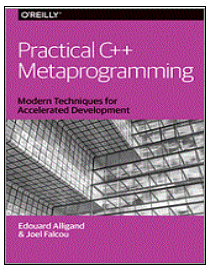- Регистрация
- 27 Авг 2018
- Сообщения
- 37,817
- Реакции
- 546,953
- Тема Автор Вы автор данного материала? |
- #1

To say that C++ programmers embrace metaprogramming is a real stretch. Outright rejection is probably more accurate. And yet, C++ template metaprogramming is ideal for performing automatic compile-time optimization. With this example-driven ebook, you’ll learn how improved metaprogramming techniques in C++11 and C++14 can help you avoid a lot of mistakes and tedious work by making the compiler work for you.
Authors show you how the process works and what it takes to build and apply a basic metaprogramming toolbox. Then comes the real payoff: you’ll learn about a set of existing metaprogramming techniques you can use to perform fast and precise metaprogramming tasks without error—including the Boost.MPL, Boost.Hana, and Brigand libraries.
- Understand basic metaprogramming concepts: programs whose input and output are programs themselves
- Learn how metaprogramming principles can help make your code more compact, generic, elegant, and less error-prone
- Explore how features in C++11 and C++14 make the design of metaprograms easier
- Improve performance, reduce maintenance, and test less often
- See what the future holds for C++ with proposed changes in the 2017 update
- Edouard Alligand is Chairman and CTO of Quasardb, an advanced, distributed hyper-scalable database. He has more than 15 years of professional experience in software engineering. He combines an excellent knowledge of low-level programming with a love for template metaprogramming, and likes to come up with uncompromising solutions to seemingly impossible problems.
- Joel Falcou is CTO of NumScale, an Associate Professor at the University Paris-Sud, and Researcher at the Laboratoire de Recherche d’Informatique in Orsay, France. He is a member of the C++ Standards Committee, and is the author of Boost.SIMD and NT2. His research focuses on studying generative programming idioms and techniques to design tools for parallel software development.
DOWNLOAD:



